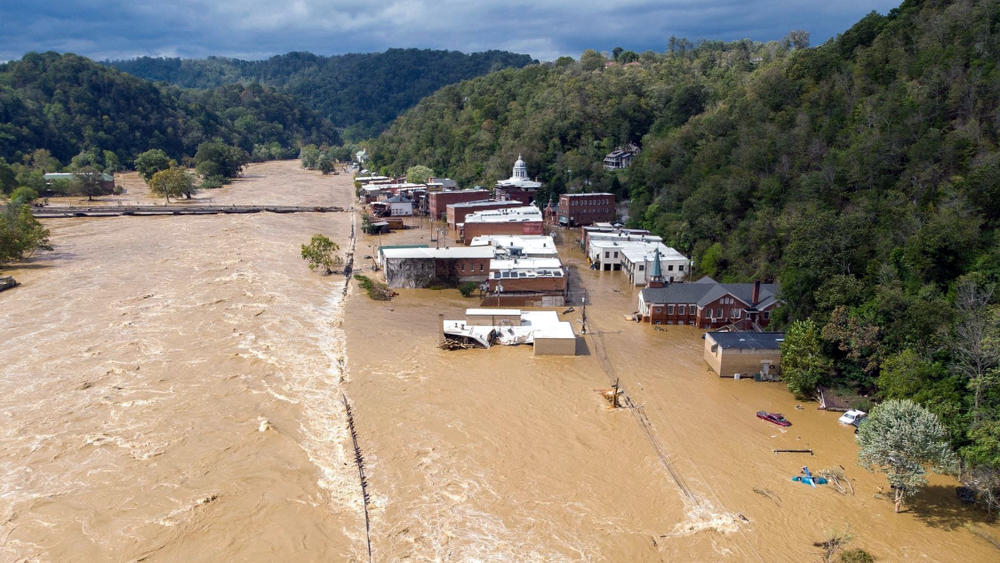
Section Branding
Header Content
Digging Out - The South's Hurricane Crisis
Primary Content
The American South is quire familiar with hurricanes. But none has ever wreaked the widespread destruction we’ve seen over the last two weeks from Florida up into the Appalachian Mountains. Salvation South editor Chuck Reece is here with a few stories he’s gathered in calls with friends and contributors.

TRANSCRIPT:
Chuck Reece: In hurricane season in the South, we expect big storms. As our planet warms, we expect them to come more often.
But the South never expected anything like what we’ve seen over the last few days. First, Hurricane Helene killed hundreds and left thousands homeless from the Florida Panhandle to the high reaches of Appalachia. Then right behind it came Milton, killing more as it roared across Florida from the Gulf side, spawning tornadoes and storm surges.
Perhaps it’s time we changed our expectations. As I heard someone remark this week, “You don’t expect to get flooded when you’re on the side of a mountain.”
Helene made landfall at the mouth of the Aucilla River on the Gulf Coast of Florida and tore a path of destruction through South Georgia all the way up to Virginia. It would take you at least eight hours to drive from that river’s mouth up to a little town in North Carolina called Old Fort.
On these very airwaves, I’ve told you stories about Old Fort. How it was left to die when the textile mills and furniture plants closed up, then started a comeback thanks to the work of a diverse coalition of community leaders. But when I got one of those leaders on the phone, he told me that many of the buildings I remembered from my visit there are now gone.
But I think the full horror of these hurricanes didn’t hit me until I got an email from Grace Buckner, a writer whose short story I was planning—am still planning—to publish in Salvation South. We had set up a video call to discuss a few edits, but the night before I got an email from Grace that began this way:
Chuck, I am in the Ingles parking lot hoping this will send. My hometown was washed away this weekend and I am just now getting the ability to get to wifi and cell service. I am safe, but have no reliable access to wifi or service so I won’t be able to meet tomorrow.
Many people have rescheduled many meetings with me over the decades, but no one, before Grace, had asked to rearrange things because where they live had literally disappeared.
Thousands of people in North and South Carolina, Florida, Tennessee, Virginia, and here in Georgia today face situations like that.
In the South, our hearts get anchored to our landscapes, the places we live, whether they are mountains or coastlines or plains and piedmonts.
One of our region’s greatest writers, the late Pat Conroy, wrote in his novel The Prince of Tides, “My wound is geography. It is also my anchorage, my port of call.”
These storms tore thousands of Southerners loose from their moorings. If these storms set someone you know adrift, go a little farther than “thoughts and prayers.” Make contact. Talk.
Human connection, you know, is a very reliable lifeline.
At SalvationSouth.com, we’ll be bringing you dispatches as our region recovers from these storms and, because we must now change our expectations, prepares for more.
Salvation South editor Chuck Reece comments on Southern culture and values in a weekly segment that airs Fridays at 7:45 a.m. during Morning Edition and 4:44 p.m. during All Things Considered on GPB Radio. You can also find them here at GPB.org/Salvation-South.
The American South is quite familiar with hurricanes. But none has ever wreaked the widespread destruction we’ve seen over the last two weeks from Florida up into the Appalachian Mountains. Salvation South editor Chuck Reece is here with a few stories he’s gathered in calls with friends and contributors.






